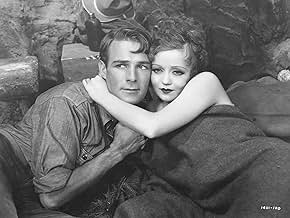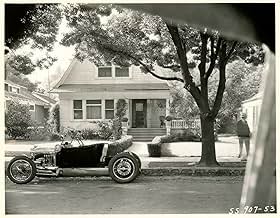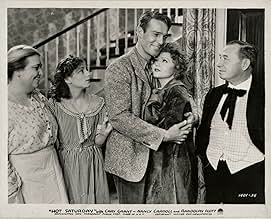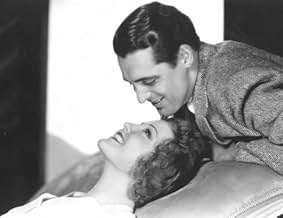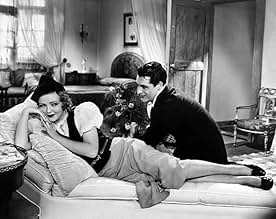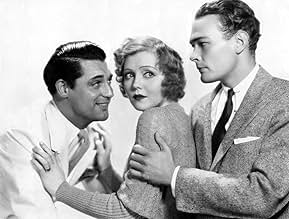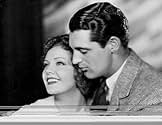IMDb RATING
6.5/10
1.5K
YOUR RATING
A pretty but virtuous small-town bank clerk is the victim of a vicious rumor from an unsuccessful suitor that she spent the night with a notorious womanizer.A pretty but virtuous small-town bank clerk is the victim of a vicious rumor from an unsuccessful suitor that she spent the night with a notorious womanizer.A pretty but virtuous small-town bank clerk is the victim of a vicious rumor from an unsuccessful suitor that she spent the night with a notorious womanizer.
Lilian Bond
- Eva Randolph
- (as Lillian Bond)
Nora Cecil
- Gossip on Telephone
- (uncredited)
Billy Engle
- Third Bank Customer
- (uncredited)
Kenner G. Kemp
- Party Guest
- (uncredited)
Marjorie Main
- Gossip in Window
- (uncredited)
Dave O'Brien
- Party Guest
- (uncredited)
6.51.5K
1
2
3
4
5
6
7
8
9
10
Featured reviews
Now This Is the Way to Do a Twist Ending
"Hot Saturday" is a terrific little movie, and much better than its IMDb rating would suggest.
This was my first exposure to Nancy Carroll, and it's clear from her performance and screen presence why she was such a major star, if only for a short time. She plays a young woman living in a small town who becomes the subject of rumors when she's seen cavorting with a known rascal, played by Cary Grant, who likewise proves why he rocketed to stardom and stayed there. When Carroll realizes the small-minded people of the town are going to treat her like a floozy whether or not any of the rumors are true, she decides to make them true by giving the town (and Grant) what they want. This happens much to the dismay of her solid, down-to-earth beau, played by Randolph Scott.
I was not expecting this film to end the way it did, and was thrilled at the way it completely defied my expectations. Carroll doesn't see the error of her ways, apologize to her mom and dad and hunker down to a nice, sensible marriage with Scott. Instead, she hops in a car, essentially gives the entire town the finger, and rides off with Grant. Take that, Production Code!!
It was so refreshing to see a film that allows a woman her sexuality without forcing her to apologize for it by the film's end. Sure, she's going to be branded a slut by the town she's leaving behind, but the movie makes the town and the people in it so miserable that the viewer doesn't care any more for its opinion than Carroll does herself.
"Hot Saturday" is on a double DVD bill with "Torch Singer," and the two films together make a dynamite duo.
Grade: A-
This was my first exposure to Nancy Carroll, and it's clear from her performance and screen presence why she was such a major star, if only for a short time. She plays a young woman living in a small town who becomes the subject of rumors when she's seen cavorting with a known rascal, played by Cary Grant, who likewise proves why he rocketed to stardom and stayed there. When Carroll realizes the small-minded people of the town are going to treat her like a floozy whether or not any of the rumors are true, she decides to make them true by giving the town (and Grant) what they want. This happens much to the dismay of her solid, down-to-earth beau, played by Randolph Scott.
I was not expecting this film to end the way it did, and was thrilled at the way it completely defied my expectations. Carroll doesn't see the error of her ways, apologize to her mom and dad and hunker down to a nice, sensible marriage with Scott. Instead, she hops in a car, essentially gives the entire town the finger, and rides off with Grant. Take that, Production Code!!
It was so refreshing to see a film that allows a woman her sexuality without forcing her to apologize for it by the film's end. Sure, she's going to be branded a slut by the town she's leaving behind, but the movie makes the town and the people in it so miserable that the viewer doesn't care any more for its opinion than Carroll does herself.
"Hot Saturday" is on a double DVD bill with "Torch Singer," and the two films together make a dynamite duo.
Grade: A-
Gossip
Newcomer Cary Grant was paired with Paramount star Nancy Carroll in Hot Saturday, a film which is most dated, but still packs quite a punch. Nancy Carroll's stardom was beginning to slip while Cary as we know was fast on the rise.
Hot Saturday however is about gossip, something that will eternally be with us. But happy to say some people's attitudes have definitely changed for the better. Nancy Carroll would not be fired today from her job at a bank because of her private life.
Carroll's a popular girl with all the young men of her town, but she's engaged to stalwart Randolph Scott who's a promising young engineer. One of her fellow co-workers at the bank Edward Wood tries to put the moves on her, but she won't give him a tumble. It's he who starts a nasty rumor about Carroll and the town playboy Cary Grant who is guilty of nothing more than offering her a ride home in his car after she ran off from Woods.
Depending on where you are from malicious gossip will probably not have the effect it does on Nancy Carroll. Still it can damage one. Years ago in a former place of work and we're talking now about the 1970s I recall in my office there was a section known as the 'poison pond'. It was where a few women who had nothing else to do but gossip about everything and everyone else around. No escaped their malicious tongues and something like what happens to Nancy Carroll would have been grist for that mill for a month.
Thank God people have a more live and let live attitude, but gossip is still a perennial problem and Hot Saturday deals nicely with it.
Hot Saturday however is about gossip, something that will eternally be with us. But happy to say some people's attitudes have definitely changed for the better. Nancy Carroll would not be fired today from her job at a bank because of her private life.
Carroll's a popular girl with all the young men of her town, but she's engaged to stalwart Randolph Scott who's a promising young engineer. One of her fellow co-workers at the bank Edward Wood tries to put the moves on her, but she won't give him a tumble. It's he who starts a nasty rumor about Carroll and the town playboy Cary Grant who is guilty of nothing more than offering her a ride home in his car after she ran off from Woods.
Depending on where you are from malicious gossip will probably not have the effect it does on Nancy Carroll. Still it can damage one. Years ago in a former place of work and we're talking now about the 1970s I recall in my office there was a section known as the 'poison pond'. It was where a few women who had nothing else to do but gossip about everything and everyone else around. No escaped their malicious tongues and something like what happens to Nancy Carroll would have been grist for that mill for a month.
Thank God people have a more live and let live attitude, but gossip is still a perennial problem and Hot Saturday deals nicely with it.
"Is Listerine good for brains?"
Small town 'nice' girl (Nancy Carroll) becomes victim of rumors that she spent the night with wealthy playboy (Cary Grant). Because of this she loses her job and her boyfriend (Randolph Scott). Decent Pre-Coder with some risqué subject matter. Love the funny scene where Nancy Carroll wrestles her younger sister and removes her underwear. Carroll is cute and has good chemistry with Grant. Cary's very charming even this early in his career. Scott's fine, too. Jane Darwell plays Carroll's shrewish mother. Nice production and small town atmosphere. I saw this on TCM and the print is exceptionally good for a movie this old.
Good story about small-town society
Ruth (Nancy Carroll) is a bank clerk in a small town where the only diversion for young adults is a dance hall named Willow Springs outside of town. Ruth is pursued by a number of young men, including a wealthy playboy, Romer Sheffield (Cary Grant). She is very successful at keeping them all at arm's length, though she occasionally enjoys tempting them.
After Ruth returns home later than usual, the town's rumor mill--spurred by rival Eva--has a heyday. With her reputation ruined, Ruth makes some choices that are life-altering.
The music that accompanies the opening credits might lead the viewer to expect a madcap comedy. It is nothing of the sort. It is a scathing depiction of small-town society. However, the ending--which is, if nothing else, confusing--suggests that the film is (also) a cautionary tale. Whichever way you interpret it, this film is very interesting.
The acting is good. Nancy Carroll shines. Cary Grant and Randolph Scott are strong in their roles.
After Ruth returns home later than usual, the town's rumor mill--spurred by rival Eva--has a heyday. With her reputation ruined, Ruth makes some choices that are life-altering.
The music that accompanies the opening credits might lead the viewer to expect a madcap comedy. It is nothing of the sort. It is a scathing depiction of small-town society. However, the ending--which is, if nothing else, confusing--suggests that the film is (also) a cautionary tale. Whichever way you interpret it, this film is very interesting.
The acting is good. Nancy Carroll shines. Cary Grant and Randolph Scott are strong in their roles.
Some Like it Hot Saturday
Hot Saturday is neat little pre-code drama with one of Cary Grant's earliest starring roles. Grant is top-billed but the center of the film is actually Nancy Carroll, an enormously popular young actress in the first years of the talkies, 1929-1931 but apparently already starting to slip in 1932 being second-billed to a newcomer.
Carroll is a pretty bank clerk whom all the local boys are crazy about, including scandalous young heir Cary Grant as Romer Sheffield (aren't all Sheffields in old movies wealthy?), who brings out of town girls in to stay at his estate for weeks at a time. When Cary invites the local young people to his home on the lake for a party, they all happily agree even though he is quite infamous among the older folks. Carroll is escorted by local boy Edward Woods. who turns into quite a leech on private boat ride and when Nancy won't come across, abandons her on the other side of the lake. Nancy ends up walking some distance and the nearest home just so happens to be Cary's estate. When she is seen by her trampy rival Lilan Bond coming home in Grant's car, the jealous bitch starts a rumor that spreads like wildfire that Nancy spent the night alone with Cary, a rumor that causes Nancy to lose her job and threatens her long, chaste romance with Randolph Scott.
This little melodrama has an excellent cast (except for Bond, whose line readings are flat) that makes the slim story interesting. Nancy Carroll is cute and does very well with her role, making her part sympathetic at all times but she is saddled with a terrible hairstyle and has on way too much makeup. Cary Grant is excellent as the free-loving hedonist to whom marriage is a no-no but he is surprisingly topped in sex appeal by his friend Randolph Scott as the decent and shy semi-beau of Carroll's. Edward Woods is very effective as the All American pal who turns out to be a major creep and there's a very good performance from Jane Darwell as Nancy's bossy and prudish mother. Hot Saturday is not a classic but it definitely deserves a look if you enjoy pre-codes.
Carroll is a pretty bank clerk whom all the local boys are crazy about, including scandalous young heir Cary Grant as Romer Sheffield (aren't all Sheffields in old movies wealthy?), who brings out of town girls in to stay at his estate for weeks at a time. When Cary invites the local young people to his home on the lake for a party, they all happily agree even though he is quite infamous among the older folks. Carroll is escorted by local boy Edward Woods. who turns into quite a leech on private boat ride and when Nancy won't come across, abandons her on the other side of the lake. Nancy ends up walking some distance and the nearest home just so happens to be Cary's estate. When she is seen by her trampy rival Lilan Bond coming home in Grant's car, the jealous bitch starts a rumor that spreads like wildfire that Nancy spent the night alone with Cary, a rumor that causes Nancy to lose her job and threatens her long, chaste romance with Randolph Scott.
This little melodrama has an excellent cast (except for Bond, whose line readings are flat) that makes the slim story interesting. Nancy Carroll is cute and does very well with her role, making her part sympathetic at all times but she is saddled with a terrible hairstyle and has on way too much makeup. Cary Grant is excellent as the free-loving hedonist to whom marriage is a no-no but he is surprisingly topped in sex appeal by his friend Randolph Scott as the decent and shy semi-beau of Carroll's. Edward Woods is very effective as the All American pal who turns out to be a major creep and there's a very good performance from Jane Darwell as Nancy's bossy and prudish mother. Hot Saturday is not a classic but it definitely deserves a look if you enjoy pre-codes.
Did you know
- TriviaThis was Cary Grant's first role as a leading man.
- GoofsWhen Conny Billop signs his name in Ruth's date planner, he spells it "Connie", but in the credits the character's name is listed as Conny.
- Quotes
Ruth Brock: Is Listerine good for brains?
Romer Sheffield: Love they tell me is better.
- Crazy credits(Opening titles) Marysville boasted of one bank, two fire engines, four street cars, and a busy telephone exchange. Everyone knew on Sunday what everyone else did on Saturday... and the rest of the week.
- ConnectionsFeatured in Hollywood: The Gift of Laughter (1982)
- SoundtracksIsn't It Romantic?
(uncredited)
Written by Richard Rodgers and Lorenz Hart
Heard on soundtrack when Carroll arrives at Grant's house.
- How long is Hot Saturday?Powered by Alexa
Details
- Release date
- Country of origin
- Official sites
- Language
- Also known as
- Sábado de juerga
- Filming locations
- Production company
- See more company credits at IMDbPro
- Runtime
- 1h 13m(73 min)
- Color
- Aspect ratio
- 1.37 : 1
Contribute to this page
Suggest an edit or add missing content

